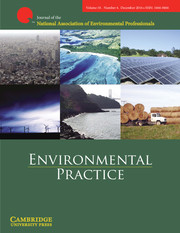The spring issue for Environmental Practice has been focused traditionally on the National Association of Environmental Professionals (NAEP) conference in April. The NAEP/AEP joint conference “Walk the Talk” was held in Los Angeles, where the principles behind economic development and environmental conservation were put into practice by professionals across a broad spectrum of environmental professions. The articles in this issue of Environmental Practice reflect that same spirit of practical application of those ideals. We return to our focus on international environmental research and work in the following issues after this spring issue. This issue provides some stimulating research and commentary on our profession and discipline.
David Berry starts us off with an overview of clean energy programs in Arizona and the practical challenges and successes of organizations on the ground. The results of the study are geared toward ensuring the success of renewable energy facilities in large, community-based programs in ways that will have a real impact on energy consumption. In a study that will improve local disclosure of community change and environmental health risks, Kathryn Brasier, Diane McLaughlin, Danielle Rhubart, Richard Stedman, Matthew Filteau, and Jeffrey Jacquet analyze public opinion and risk perceptions of natural gas development. Piet and Carole deWitt tell us which fields can expect the longest preparation times for environmental impact statements; their results are organized by federal entity, enabling professionals to know what results most impact their specific field and to plan their projects more effectively. And Walter Kropp and James Lein provide readers with analytical tools for sustainable urban development. Using spatial multicriteria decision analysis, Kropp and Lein work toward improved sustainability assessment so communities can advance broader goals related to global environmental change.
Matto Mildenberger, Leah Stokes, Beth Savan, Brian Kolenda, and Dan Dolderman argue that the tools used by environmental practitioners for information campaigns are ill-suited to work with the practical realities of human behavior. They present us with a community-based social marketing approach to delivering information to the public in a cost-efficient manner. Ultimately, this study recommends more regular dialogue between social science researchers and energy conservation practitioners so the latter can more effectively enact the policies of the former. Finally, Laura Pavlot and Hugh Gorman discuss the public's role in a program designed to streamline permitting, as well as the tensions that emerge when policies become action. Ultimately, resolving tensions among developers, planners, and community participants is the only way to put smart growth into practice.
The authors of this issue all reflect the “Walking the Talk” theme by ensuring that the process between idea and execution is smooth. In September, we continue our dedication to international concerns with our special issue on China's environmental challenge, an exciting issue including many controversial ones surrounding environmental topics in nations with fast-growing economies.


